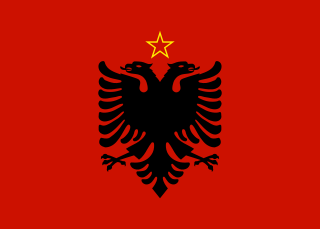
The Social Democratic Party of Albania is a social-democratic minor political party in Albania. The party held seats in Parliament between 1992 and 1996, and again from 1997 until 2009. It is currently led by Skënder Gjinushi, a former Minister of Education (1987–1991) and Speaker of Parliament.
The Unity for Human Rights Party is a social-liberal political party in Albania supporting the Greek minority. Founded in 1992, it represents Albania's minorities and is mainly related to the Greek minority, and is the political continuation of Omonoia. It works with Omonoia, MEGA and other Greek parties in Albania at national elections, under a Greek bloc. The party is currently led by Vangjel Dule, who held the party's only seat in Parliament until 2017.
Parliamentary elections were held in Albania on 3 July 2005. The result was a victory for the opposition Democratic Party (PD) and its allies, prominently the Republican Party (PR). Former president Sali Berisha became prime minister as a result of the election. Voter turnout was only 48.0%.

Parliamentary elections were held in Macedonia on 18 October 1998, with a second round on 1 November. VMRO-DPMNE emerged as the largest party, winning 49 of the 120 seats, and later formed a coalition government with Democratic Alternative and the Democratic Party of Albanians.
Parliamentary elections were held in Montenegro on 20 October 2002. The result was a victory for the For a European Montenegro alliance formed by the Democratic Party of Socialists of Montenegro and the Social Democratic Party of Montenegro, which won 39 of the 75 seats. It was the last parliamentary election held in Montenegro prior to independence in 2006.

Parliamentary elections were held in Iceland on 25 April 1987. The Independence Party remained the largest party in the Lower House of the Althing, winning 12 of the 42 seats.

General elections were held in Malta on 9 May 1987. Although the Nationalist Party received the most votes, the Malta Labour Party won a majority of seats. However, in accordance with the modifications made to the electoral system following a similar outcome in the 1981 elections, the Nationalist Party was awarded an extra four seats in order to give them a parliamentary majority.
Early parliamentary elections were held in Albania on 29 June 1997 alongside a simultaneous referendum on restoring the monarchy, with a second round of voting for 32 seats on 6 July. The elections were called as a response to the 1997 Pyramid Crisis. The result was an overwhelming victory for the opposition Socialist Party of Albania, which won 101 of the 151 seats. Voter turnout was 72.6%.
Parliamentary elections were held in the People's Republic of Albania on 28 May 1950. Candidates were nominated by the Democratic Front, which was an organization subservient to the ruling Albanian Party of Labour. The Front won all 121 seats, with voter turnout reported to be 99.4%.
Parliamentary elections were held in the People's Republic of Albania on 1 June 1958. The Democratic Front was the only party able to contest the elections, and subsequently won all 188 seats. Voter turnout was reported to be 100%.
Parliamentary elections were held in the People's Republic of Albania on 3 June 1962. The Democratic Front was the only party able to contest the elections, and subsequently won all 214 seats. Voter turnout was reported to be 100%.
Parliamentary elections were held in the People's Republic of Albania on 10 July 1966. The Democratic Front was the only party able to contest the elections, and subsequently won all 240 seats. Voter turnout was reported to be 100%.
Parliamentary elections were held in the People's Republic of Albania on 20 September 1970. The Democratic Front was the only party able to contest the elections, and subsequently won all 264 seats with 100% of the vote. Voter turnout was reported to be 100%.
Parliamentary elections were held in the People's Republic of Albania on 6 October 1974. The Democratic Front was the only party able to contest the elections, and subsequently won all 250 seats. Voter turnout was reported to be 100%.
Parliamentary elections were held in the People's Socialist Republic of Albania on 12 November 1978. The Democratic Front was the only party able to contest the elections, and subsequently won all 250 seats. Voter turnout was reported to be 100%, with all but one of the country's 1,436,289 registered voters casting votes.
Parliamentary elections were held in the People's Socialist Republic of Albania on 14 November 1982. The Democratic Front was the only party able to contest the elections, and subsequently won all 250 seats. Voter turnout was reported to be 100%.
A referendum on restoring the monarchy was held in Albania on 29 June 1997 alongside parliamentary elections. Officially the proposal was rejected by 66.7% of voters, although Crown Prince Leka claimed that 65.7% voted in favour.
Parliamentary elections were held in Albania on 22 March 1992, with a second round of voting for eleven seats on 29 March. The result was a victory for the opposition Democratic Party of Albania, which won 92 of the 140 seats. After the election Aleksandër Meksi became Prime Minister and Sali Berisha became President.
Parliamentary elections were held in Albania on 26 May 1996, with a second round of voting for 25 seats on 2 June. The result was a victory for the ruling Democratic Party of Albania, which won 122 of the 140 seats. Voter turnout was 89.1%.
Parliamentary elections were held in the People's Republic of Albania on 28 May 1954. The Democratic Front was the only party able to contest the elections, and subsequently won all 134 seats. Voter turnout was reported to be 99.9%.






